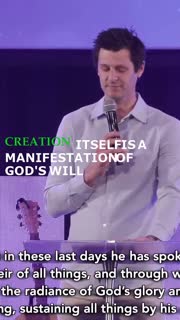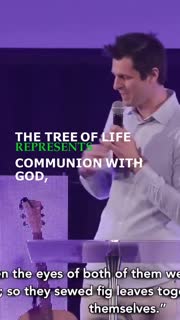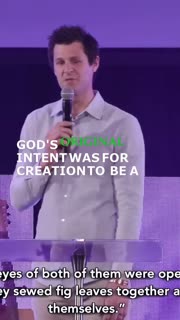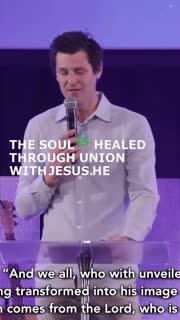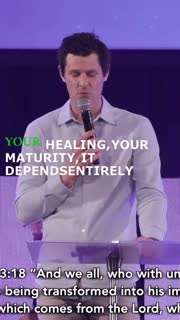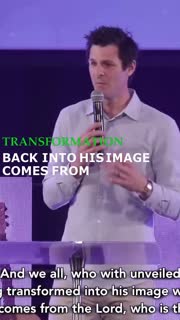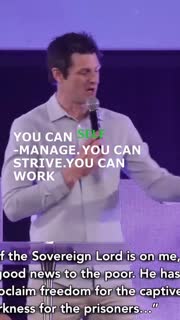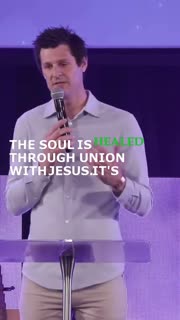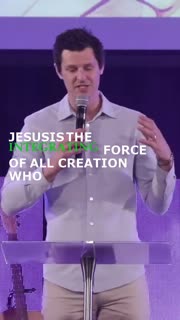Embracing Wholeness Through Grace and Union with Jesus
Devotional
Sermon Summary
Bible Study Guide
Sermon Clips
1. "All who rely on the works of a do-more Christianity are under a curse. It actually says that if you carry on reading. So let's pray, eh? Okay. Just in the name of Jesus, I revoke the curse of believing in any false gospel this morning. Lord, we submit ourselves to your pure, your unadulterated, your untainted, your freeing, gorgeous gospel of the grace of our Lord Jesus Christ. We submit ourselves to him crucified on our behalf and for our redemption. You alone, Jesus, are the author and the perfecter. And we silence every other voice in Jesus' name." [58:11] (45 seconds)
2. "Creation itself is a manifestation of God's will and purpose. Where everything is complete, is whole, is free, is interconnected through him. When we look at Eden. We see a world that was designed to function in harmony. With the essence of that being Shalom. There was freedom in harmony. Sorry, freedom in Eden. This freedom we had to choose. Freedom to choose. We had a volition to self-determine our own will. Or we could yield that same faculty in harmony to the will of God." [01:00:01] (45 seconds)
3. "The tree of life represents communion with God, which is made fully available to us through His new covenant of grace. And the tree of knowledge, on the other hand, represents choosing independence from God. It leads to pride. And it leads to legalism. A self-reliance on human reasoning. Or religion, if you want to put it that way. See, the fall. The fall dehumanized us. It took a humanity that was very good. Created in the image and likeness of God. And initiated a dehumanization. A de-creation effect. But we were made for Eden." [01:04:58] (46 seconds)
4. "God's original intent was for creation to be a harmonious reflection of His nature. With Jesus at the center. That we would just walk in the cool of the garden. In the beauty of Eden. The radiance of that word, Shalom. And we would just be naked and unashamed. As we know, God initiated a redemption plan. Right? Revelations 13, 8 says Jesus. This is at the end of the story. Says Jesus at the beginning of the story was slain before the foundations of the world. That Jesus would redeem us of our past. That He would redeem us of our sin. That He would redeem us of our prideful sinful nature." [01:05:47] (42 seconds)
5. "The soul is healed through union with Jesus. He accepts you as you are. Broken pieces and all. You are accepted because of the grace of our Lord Jesus. Do not move on from the acceptance grace of God. See, if you dive too quickly into His empowering grace without having been transformed by His acceptance, without having received His acceptance in every piece of you, then you'll just launch off. Perhaps even feeling empowered by God until you find yourself that suddenly I've actually left that grace behind. And I'm striving again. I'm just climbing up my own tree." [01:21:27] (47 seconds)
6. "Your healing, your maturity, it depends entirely on your willingness to turn everything over to Jesus. To receive His acceptance grace. All the ways that you seek stability and control, all of those self-management tools are filthy rags. Filthy rags. And so we can preach a message of grace all we like, and you can even start to comprehend it, and you can read Joseph Prince books. You can even listen to Andrew Womack and Andrew Farley until the cows come home. But, you can start to understand it, and yet you can still default to the same internal narratives, those same thought patterns, the do better, those mechanisms." [01:23:42] (57 seconds)
7. "Transformation back into His image comes from encountering Him. Unveiled without fig leaves. Naked. Exposed. Every broken part of us. Every piece to Jesus. See, people will spend years in learning until they can tell you about their, their, I don't know, you pick a piece. Their, their food addiction part. And they can explain the whole thing about how it's about self protection and comfort and abandonment and body control but they'll explain their situation but that, it's not the same as being reintegrated. See, we're not after understanding, we're after wholeness. We're after having wholeheartedness." [01:20:20] (45 seconds)
8. "You can self-manage. You can strive. You can work harder. You can try and be good. You can do all that self-management tools. You can develop solutions. You can upkeep behavioral management techniques. But no amount of self-anything is going to heal you. It's not going to reintegrate those pieces. It's not going to unburden those wounded parts of you so that they become part of that whole again. In fact our management tools, our rules, our law keeping, our religiosity, well they just they actually tend to isolate those parts further." [01:18:06] (41 seconds)
9. "The soul is healed through union with Jesus. It's that simple. The soul is healed. It's reintegrated through union with Jesus. And these places, okay, any time, anywhere you need him, the soul is healed through union with Jesus. So when you wake up at 2 in the morning and your soul is crying out for attention and well you've got a choice in that moment. Suddenly Jesus is like, hey. And so you move toward him. That's it. That's all it takes. You walk into it instead of running from it. You surrender instead of fighting." [01:29:01] (48 seconds)
10. "Jesus is the integrating force of all creation who heals shattered hearts. He literally holds all things together right now or the whole world would just fly into pieces. Ourselves included. Okay, so what I want to leave with you today is that we're going to walk through a process that's available to every person on the face of the planet anytime, anywhere, because that's God. And God is available anytime, anywhere. And He really committed to the integration of His image bearers. He is deeply committed to reintegration, right?" [01:16:20] (38 seconds)
Ask a question about this sermon
2. "Creation itself is a manifestation of God's will and purpose. Where everything is complete, is whole, is free, is interconnected through him. When we look at Eden. We see a world that was designed to function in harmony. With the essence of that being Shalom. There was freedom in harmony. Sorry, freedom in Eden. This freedom we had to choose. Freedom to choose. We had a volition to self-determine our own will. Or we could yield that same faculty in harmony to the will of God." [01:00:01] (45 seconds)
3. "The tree of life represents communion with God, which is made fully available to us through His new covenant of grace. And the tree of knowledge, on the other hand, represents choosing independence from God. It leads to pride. And it leads to legalism. A self-reliance on human reasoning. Or religion, if you want to put it that way. See, the fall. The fall dehumanized us. It took a humanity that was very good. Created in the image and likeness of God. And initiated a dehumanization. A de-creation effect. But we were made for Eden." [01:04:58] (46 seconds)
4. "God's original intent was for creation to be a harmonious reflection of His nature. With Jesus at the center. That we would just walk in the cool of the garden. In the beauty of Eden. The radiance of that word, Shalom. And we would just be naked and unashamed. As we know, God initiated a redemption plan. Right? Revelations 13, 8 says Jesus. This is at the end of the story. Says Jesus at the beginning of the story was slain before the foundations of the world. That Jesus would redeem us of our past. That He would redeem us of our sin. That He would redeem us of our prideful sinful nature." [01:05:47] (42 seconds)
5. "The soul is healed through union with Jesus. He accepts you as you are. Broken pieces and all. You are accepted because of the grace of our Lord Jesus. Do not move on from the acceptance grace of God. See, if you dive too quickly into His empowering grace without having been transformed by His acceptance, without having received His acceptance in every piece of you, then you'll just launch off. Perhaps even feeling empowered by God until you find yourself that suddenly I've actually left that grace behind. And I'm striving again. I'm just climbing up my own tree." [01:21:27] (47 seconds)
6. "Your healing, your maturity, it depends entirely on your willingness to turn everything over to Jesus. To receive His acceptance grace. All the ways that you seek stability and control, all of those self-management tools are filthy rags. Filthy rags. And so we can preach a message of grace all we like, and you can even start to comprehend it, and you can read Joseph Prince books. You can even listen to Andrew Womack and Andrew Farley until the cows come home. But, you can start to understand it, and yet you can still default to the same internal narratives, those same thought patterns, the do better, those mechanisms." [01:23:42] (57 seconds)
7. "Transformation back into His image comes from encountering Him. Unveiled without fig leaves. Naked. Exposed. Every broken part of us. Every piece to Jesus. See, people will spend years in learning until they can tell you about their, their, I don't know, you pick a piece. Their, their food addiction part. And they can explain the whole thing about how it's about self protection and comfort and abandonment and body control but they'll explain their situation but that, it's not the same as being reintegrated. See, we're not after understanding, we're after wholeness. We're after having wholeheartedness." [01:20:20] (45 seconds)
8. "You can self-manage. You can strive. You can work harder. You can try and be good. You can do all that self-management tools. You can develop solutions. You can upkeep behavioral management techniques. But no amount of self-anything is going to heal you. It's not going to reintegrate those pieces. It's not going to unburden those wounded parts of you so that they become part of that whole again. In fact our management tools, our rules, our law keeping, our religiosity, well they just they actually tend to isolate those parts further." [01:18:06] (41 seconds)
9. "The soul is healed through union with Jesus. It's that simple. The soul is healed. It's reintegrated through union with Jesus. And these places, okay, any time, anywhere you need him, the soul is healed through union with Jesus. So when you wake up at 2 in the morning and your soul is crying out for attention and well you've got a choice in that moment. Suddenly Jesus is like, hey. And so you move toward him. That's it. That's all it takes. You walk into it instead of running from it. You surrender instead of fighting." [01:29:01] (48 seconds)
10. "Jesus is the integrating force of all creation who heals shattered hearts. He literally holds all things together right now or the whole world would just fly into pieces. Ourselves included. Okay, so what I want to leave with you today is that we're going to walk through a process that's available to every person on the face of the planet anytime, anywhere, because that's God. And God is available anytime, anywhere. And He really committed to the integration of His image bearers. He is deeply committed to reintegration, right?" [01:16:20] (38 seconds)

